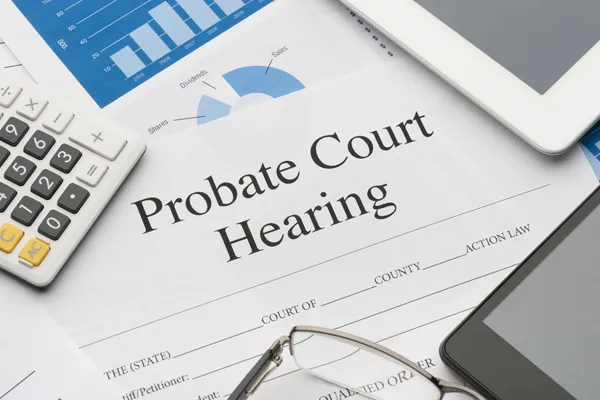
Probate is a legal process that involves administering a person's estate after death. If an individual has a will and testament, probate will serve to prove the will is legally valid.
With that said, avoiding probate is a top priority for most. The cost of a probate court can be expensive, reducing the overall amount of the estate. Not only that, but the probate process is often time-consuming and leads to a lack of privacy and control over the descendant's estate. Read on to learn more about the probate process and the steps you can take to avoid it.
When Is Probate Necessary?
There are many situations where probate is necessary. In the case of probate, it's a good idea to hire a probate lawyer to help handle your case and minimize the stress that can come with the process. Here are 6 situations when undergoing probate is required:
- Lack of Will: If there is no will, a probate is necessary in order to determine the beneficiaries and distribute assets.
- There's a Will in Place: Many people believe that having a will disregards the need for probate. However, a valid will must go through probate for the estate to be distributed to the beneficiaries.
- An Issue With an Existing Will: If there is an issue with an existing will, it will need to go through the probate process in order to determine its validity. An issue with a will can include things like mistakes made in the will, fraudulent execution, or the deceased individual made the will when they were not in sound mind.
- Assets are Solely in the Deceased Person's Name: If the descendant had assets such as property solely in their name, the estate must go through the probate process.
- Lack of Beneficiaries: When the descendant doesn't name any beneficiaries, probate is necessary. This is a common situation for deceased individuals with an IRA or 401(k) account and those with life insurance policies. Retirement accounts and insurance policies payout to beneficiaries. When these beneficiaries are not named, the accounts will automatically be probated.
- Tenant-in-Common: When a deceased person owned property with others, probate is necessary to remove the deceased individual's name and transfer their share of the property to the appropriate beneficiaries.
How Much Does Probate Cost?
The cost of probate varies greatly. However, probate costs will ultimately depend on the size of the estate. With that said, probate can cost anywhere from 3% to 7% of the total estate value. Here are some costs associated with probate:
- Court filing fees
- Appraiser fees
- Personal representative fees
These fees must be paid before the estate is distributed to the beneficiaries. It's important to note that this could lead to a liquidation of estate assets if it's necessary to raise enough money to pay fees.
In addition to this, assets sold at a gain are liable to income tax, which will further reduce the amount of the estate. Keep in mind, it's also possible that the assets could be sold under its market value or at a loss to raise the necessary money, making the beneficiaries lose out. If you have any questions about the costs of probate, be sure to talk with an experienced probate lawyer.
How Long Is the Probate Process?
Another downside to probate is that the process is often lengthy, which delays the transferring of assets. In general, the minimum time required to complete the probate process is 6 months but is often longer. Here is a general overview of the probate process:
Step 1: Open Probate
Unfortunately, the executor can't just release assets to the beneficiaries. The first step is to open probate by filing a petition with the probate court and authenticating the last will and testament if the descendant made one.
Step 2: Appointing an Executor
If there isn't already an executor of the estate, the judge will need to appoint an executor, also called a personal representative. This person will oversee the probate process and settle the estate.
Step 3: Send Notices
Once an executor has been made, they will need to notify interested parties and creditors. Interested parties are individuals who were named in the will and next to kin.
Step 4: Assess Estate
The executor will then need to take inventory of the estate by assessing its total value. Assets can be as simple as a checking account. However, assessing assets can be more complex with the inclusion of things like property, jewelry, stocks, and bonds.
Step 5: Distribute assets
The executor must carry out will instructions and distribute assets to the rightful beneficiaries. In addition to this, the executor is required to pay off all debts. An executor might also ensure accounts get closed such as retirement accounts.
Step 6: Close the Estate
Once the assets have been distributed and court and executor fees have been paid, the last step is to dissolve the estate and close the probate process.
How Can I Avoid Probate?
Avoiding probate can save a lot of time, money, and stress. With that said, individuals should strive to avoid probate whenever possible. Here are a few ways probate can be avoided:
Name Beneficiaries

One of the easiest ways to avoid probate is simply by double-checking that you've named beneficiaries on all accounts that allow you. Many people forget or avoid naming beneficiaries on their accounts. However, this can create unnecessary problems later on. Here are just some accounts you can name beneficiaries on.
- Bank accounts
- Brokerage accounts
- Life Insurance policies
- 401(k) and pension plans
- IRA accounts
Small Estate
Many states today provide shortcuts to the probate process. Thankfully, one of those shortcuts is designed for descendants who have a relatively small estate.
Every state will have its own laws in regard to what is considered a small estate. In the state of Texas, a small estate affidavit is offered when there is no will and for estates valued at $75,000 or less. A small estate affidavit will require the following information:
- Name and address of the descendant
- Date of death
- Description of assets and debts
- Name and address of distributees
- Signatures of distributees
It's important to note that the affidavit must be signed by each distributee under Texas Intestacy law who is of legal capacity. In addition, the guardian or any distributee who is a minor or legally incapacitated must sign.
Transfer on Death Accounts
A transfer on death designation allows beneficiaries to receive assets at the time of the individual's death without going through probate. With a transfer on death account, the beneficiaries do not have access or control over the assets while the person is alive. Accounts like Individual Retirement, 401(k), and other types of retirement accounts are TOD.
POD Designation
Payable on death is an arrangement between a bank or credit union and a client who wants to designate all of their assets to their beneficiaries upon death. If you have a bank account or certificate of deposit, you can designate a beneficiary to inherit any money on the account after death. This ensures that your bank accounts and certificate of deposits do not end up in probate court.
Converting an account into a POD is a simple and free process. All that's needed is a form that can be found either at your bank or a credit union. In addition to this, the account holder needs to call their bank to tell them who their beneficiaries will be. The bank will then give the account holder beneficiary designation forms to finalize the process.
What's the Difference Between POD and TOD?
A POD account focuses on bank assets rather than investment assets such as stocks, bonds, and mutual funds.
Joint Tenancy With Right of Survivorship
If you own property, it's a good idea to consider joint tenancy as a way to avoid the lengthy probate process. This is because property with joint tenancy automatically goes to the surviving owner(s) without going through the probate process.
In the state of Texas, all joint tenants must sign an agreement that can be provided by the bank. Once one owner dies, the new owner will present the form along with a death certificate to the record keeper. A record-keeper could be a bank or a state motor vehicle department.
Set up a Trust
A trust is a fiduciary agreement that allows a trustee to hold assets on the behalf of beneficiaries. If you have a substantial amount of assets, it's a good idea to consider setting up a trust to avoid probate.
A trust will outline what will be done in regard to asset distribution without the need for direction from the probate court. When you designate a trustee, they will manage your trust and make decisions for your beneficiaries. Here are two types of trusts to consider:
- Revocable Trust: A revocable trust is also known as a living trust. It allows assets to pass through without the probate process and allows individuals to retain control over assets during the grantor's lifetime. A revocable trust is flexible and can be dissolved at any time.
- Irrevocable Trust: An irrevocable trust is a type of trust where the terms cannot be changed without the permission of the grantor's beneficiaries. With an irrevocable trust, the grantor has released all rights of ownership of the assets and the trust.
No one wants to go through the probate process. Probate court doesn't just take a significant length of time, its potential costs can really put a dent in the overall value of your estate. Not only that, but probate proceedings are a matter of public records, which means your family matters and private information is open to the public.
Conclusion
With that said, there are various steps individuals can take to avoid probate. If you are currently planning your estate, consider an estate attorney who can ensure your documents comply with current laws and provide you with legal advice to ensure you can successfully plan your estate. Contact us today to learn more about how we can help you.
For more information please request a copy of our Legal Services Schedule (PDF format).
![]()